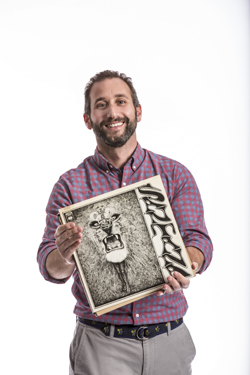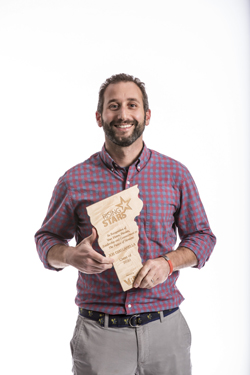JOE Giallanella
39 | Seventh Generation | Team Lead: Growth Incubator
Residence: Burlington
 Career highlight(s): I have been fortunate throughout my career to be in a position to make an impact during unprecedented times. First, while in the investment world, I advised non-profit institutions during the economic fallout of 2008. Then, after shifting into brand management of consumer goods, I developed food products to meet shoppers’ new behaviors during the Great Recession. Now, during the COVID-19 pandemic while at Seventh Generation, I am launching transformational, green cleaning products in response to a global health threat. Each of these extraordinary circumstances has afforded me the opportunity to listen, learn, and lead.
Career highlight(s): I have been fortunate throughout my career to be in a position to make an impact during unprecedented times. First, while in the investment world, I advised non-profit institutions during the economic fallout of 2008. Then, after shifting into brand management of consumer goods, I developed food products to meet shoppers’ new behaviors during the Great Recession. Now, during the COVID-19 pandemic while at Seventh Generation, I am launching transformational, green cleaning products in response to a global health threat. Each of these extraordinary circumstances has afforded me the opportunity to listen, learn, and lead.
 Community Involvement: I love contributing to my hyper-local community, creating relationships and friendships with my immediate neighbors. A key focus of my community involvement has long been in early childhood education. Having benefited from an enriching, early learning environment growing up, I believe that every child should have a similar opportunity to succeed from the outset.
Community Involvement: I love contributing to my hyper-local community, creating relationships and friendships with my immediate neighbors. A key focus of my community involvement has long been in early childhood education. Having benefited from an enriching, early learning environment growing up, I believe that every child should have a similar opportunity to succeed from the outset.
Whether it has been tutoring elementary school children in math, committing time as a Morning Champ at Champlain Elementary School, or serving as a volunteer Board member at Pine Forest Children’s Center, I always value and source energy from giving back to educational cornerstones in our community.
What motivated you to live and work in Vermont? My wife, Lucia, and I saw Vermont as an amazing place to raise a family. Burlington in particular is a tight-knit, friendly community that embraces arts, culture, and the open expression of ideas. Coupled with the beautiful backdrop of Lake Champlain, short commutes to work and school, and new opportunities emerging each day, we knew that we found the right place to grow our family.
Favorite part of your job? At Seventh Generation, which is a leader in sustainability and a founding B-Corp, it is readily apparent that the business prioritizes more than just its delivery of profits, but instead makes a positive impact financially, socially, and environmentally. I am a firm believer in the stakeholder theory of creating value – as opposed to shareholder value creation and its limited focus on profitability – to drive a business; I love that I can show up every day to an organization that was created with a similar mindset and maintains a triple-bottom line approach.
What is the best career advice you have received? Rowing was a big part of my life throughout high school and college and influenced the way I approach my career. Crew is a sport that emphasizes routine, mental fortitude, and a strong work ethic but those personal attributes only get you so far; rowing also requires a strong commitment to teamwork. It is with that in mind that I invest heavily in time and attention to those around me. Developing a team environment built on trust, feedback, and constant improvement has been a key tenet of my approach at work.
Favorite downtime activity: When I’m not setting my fantasy sport lineup or keeping an eye on baseball scores, I love exercising outdoors. You can find me either walking outside with a podcast playing in my ear, biking with my family out to the Causeway, or taking a run through the neighborhood.
Person you would most like to share a Vermont beverage with: Jerry Seinfeld and Larry David, though it would be difficult to drink when laughing so hard.
How has your community service changed since the pandemic? The pandemic highlighted the need to fast-track what had been long-term goals, particularly those tied to compensation and care within our non-profit organizations. With that understanding, the Board of Directors at Pine Forest Children’s Center worked closely with the administration and its generous community of families to build out a package of benefits for our early childhood educators and ensure that all full-time employees are paid a livable wage, despite the financial strain the pandemic placed on the organization. Our early childhood educators and staff are so critical to our children’s future success and to our economy today, that they need to be taken care of first so that they can in turn care for our children.
